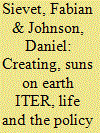| Srl | Item |
| 1 |
ID:
096502


|
|
|
|
|
| Publication |
2010.
|
| Summary/Abstract |
Concerns about climate change and energy security have prompted some countries to revive dormant nuclear fission power programs to meet growing energy demands and reduce carbon dioxide emissions. However, this so-called nuclear renaissance based on fission would have major drawbacks in the areas of safety, security, and nonproliferation. Nuclear fusion, however, is portrayed by its proponents as mitigating these drawbacks, and scientists continue to pursue fusion's promise with two large-scale projects: the International Thermonuclear Experimental Reactor (ITER), and the Laser Inertial Fusion Engine (LIFE) reactor. Although supporters often hail fusion as proliferation resistant, the technology could be used to create weapons-usable fissile material. This article explains how fissile material could be created in ITER or LIFE and analyzes other nonproliferation implications of fusion; the authors discuss the various challenges faced by ITER and LIFE.
|
|
|
|
|
|
|
|
|
|
|
|
|
|
|
|
| 2 |
ID:
163575


|
|
|
|
|
| Summary/Abstract |
Identity fusion, the visceral sense of interconnectedness between oneself and the members of a group, has been associated with military service anecdotally and examined among foreign military groups. However, no study to date has explored fusion and its relationship with functioning among U.S. military members. The aims of this study were (1) to examine the incremental predictive validity of fusion, (2) to examine the relationship between fusion and pro- and antisocial in-group behaviors, and (3) to determine how one’s attitude toward their military service may affect fusion. Data were collected via self-report using Amazon’s Mechanical Turk software. Results indicated that fusion predicted progroup beliefs and in-group helping behaviors above and beyond other indicators of military identity. Further, satisfaction with the military mediated the relationship between fusion and willingness to give time to other veterans. Identifying an important mediator of fusion expands upon earlier work in the field and suggests routes for future inquiry.
|
|
|
|
|
|
|
|
|
|
|
|
|
|
|
|
| 3 |
ID:
139705


|
|
|
| 4 |
ID:
177386


|
|
|
|
|
| Summary/Abstract |
Fusion energy is often regarded as a long-term solution to the world's energy needs. However, even after solving the critical research challenges, engineering and materials science will still impose significant constraints on the characteristics of a fusion power plant. Meanwhile, the global energy grid must transition to low-carbon sources by 2050 to prevent the worst effects of climate change. We review three factors affecting fusion's future trajectory: (1) the significant drop in the price of renewable energy, (2) the intermittency of renewable sources and implications for future energy grids, and (3) the recent proposition of intermediate-level nuclear waste as a product of fusion. Within the scenario assumed by our premises, we find that while there remains a clear motivation to develop fusion power plants, this motivation is likely weakened by the time they become available. We also conclude that most current fusion reactor designs do not take these factors into account and, to increase market penetration, fusion research should consider relaxed nuclear waste design criteria, raw material availability constraints and load-following designs with pulsed operation.
|
|
|
|
|
|
|
|
|
|
|
|
|
|
|
|